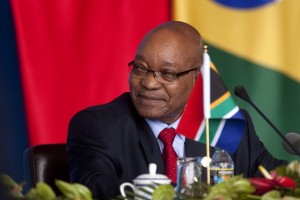Cape Town – President Jacob Zuma released a report on Friday that will guide the state’s reformation of South Africa’s State Owned Enterprises (SOE).
During his State of the Nation address on Thursday, Zuma announced interventions in SOEs based on the Presidential Review Commission (PRC) on SOEs that he established in 2011.
Deputy President Cyril Ramaphosa headed the inter-ministerial committee responsible for the overview.
“For the state owned companies to contribute to the successful implementation of the National Development Plan, they must be financially sound, be properly governed and managed,” Zuma said.
“We will ensure the implementation of the recommendations of the Presidential Review Commission on State Owned Enterprises, which outlines how the institutions should be managed.”
Zuma said as a result of the review, certain SOEs will be phased out.
The report, which was initially deemed secret and for Zuma’s eyes only, has been published on the Presidency’s website for the public to explore.
“The SOEs reform principles supported in this report are designed to guide South Africa towards comprehensive reforms in the SOE environment to deal with current and future challenges facing the nation,” the report explained.
“The SOEs reform principles supported in this report are designed to guide South Africa towards comprehensive reforms in the SOE environment to deal with current and future challenges facing the nation,” the report said.
“SOEs are not regarded as a panacea for solving all challenges of South Africa, but are an added strategic and catalytic State instrument for transformation, growth, development, service delivery and employment creation.”
“They can make a significant contribution towards attainment of the Developmental State,” it said.
“However, without strong vision and committed leadership; an enabling legal environment; effective performance evaluation; and appropriate competencies and capacities, effective and sustainable change will not occur in the SOE environment and, accordingly, the objectives of the Developmental State will not be realised.
“For South Africa to have optimally performing SOEs that contribute to transformation, growth, development, and service delivery, the proposed reform principles and recommendations in this report must be implemented from the highest office in the land throughout all government structures and in all spheres in partnership with all formations of the society.
“The principles include, among others, the separation of roles by government; the formulation of a strategy for SOEs; creation of an enabling environment; and ensuring adequate performance evaluation and monitoring of SOEs.
“The state must have the requisite capacities to implement these reforms including visioning and strategy-setting, appropriate human capital and structures, as well as efficient and electronic oversight systems to enabling monitoring and evaluation of SOEs.
“We propose that government should establish a transitional SOEs reforms committee to drive implementation of the recommendations of the PRC. It should also form an SOE Council of Ministers to capacitate effective oversight of SOEs.
“Commercial SOEs and DFIs should be overseen by a central SOE authority and a central remuneration authority for SOEs is recommended to ensure consistency and accountability of remuneration frameworks and practices in SOEs.”
The presidential review committee said the below 21 principles should be endorsed by government to guide SOE reforms:
1.The government must have a vision and strategy for the developmental state.
2.The Government should identify strategic sectors that will support the vision and strategy of a Developmental State and within which SOEs will play a role.
3.There must be recognition that SOEs are critical in attaining the objectives of the developmental state.
4.Profit and non-profit objectives of SOEs must be clearly defined.
5.The government must maintain a consolidated SOEs database.
6.The government must strive to create legislative clarity.
7.The government must delineate the separate roles of government as owner, policy-maker, regulator and implementer.
8.The government should adopt a policy for mandatory periodic reviews of SOEs.
9.The owner or executive authority must play a stronger role in setting the strategic direction and framework for SOEs.
10. The government should adopt appropriate funding principles and models.
11. The government should ensure consolidation of the SOEs. Clustering and centralising should be in the following groupings: commercial, development finance institutions, statutory corporations, and non-commercial SOEs.
12. Performance should be assessed on the basis of efficiency and effectiveness as well as service delivery.
13. Financial information should be improved. A good accounting system should be established.
14. SOEs must play a leadership and catalytic role in transformation and development.
15. Financial viability: The principles should measure how well a SOE delivers on its core mandates as well as meeting its determined developmental objectives.
16. SOE remuneration principles: These should ensure competitiveness and optimum retention by improving remuneration policies and practices to ensure alignment and harmonisation across SOEs as well as improving governance and oversight of SOE remuneration by the executive authority.
17. Invest in human resources: Good enterprises require capable people to run them.
18. SOE collaboration and coordination principles.
19. SOEs should champion relevant skills and human resources development.
20. Reduce the number of SOEs and streamline where appropriate. This will mean better synergy and efficiency and it will reduce the demand on monitoring resources.
21. The government should enhance its capacity: SOE including boards and executives must be appropriately skilled in understanding the unique role they play in society.
